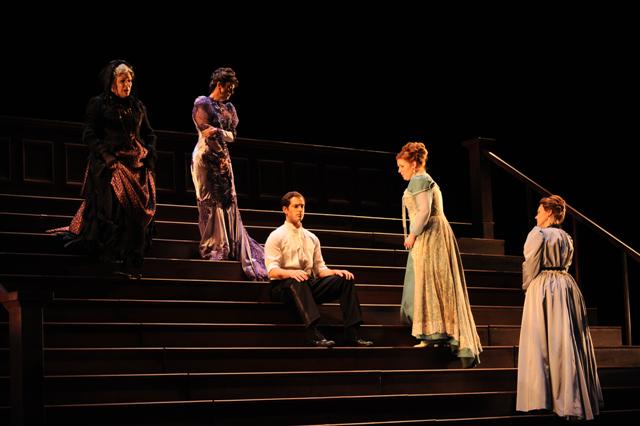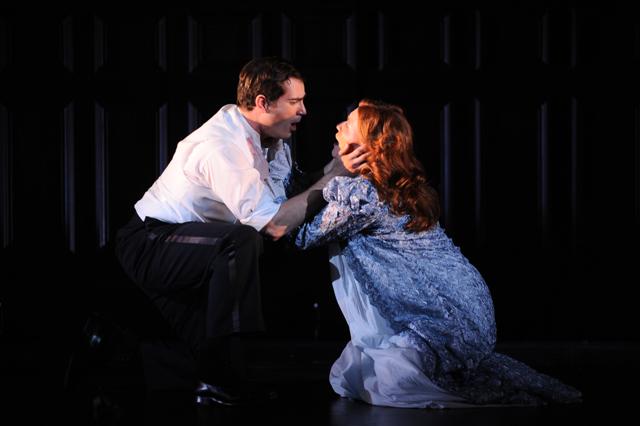COT’s fine cast and stylish staging can’t save Britten’s talky, turgid “Wingrave”

Commissioned by the BBC, Owen Wingrave has a certain historical significance as the only Benjamin Britten opera to premiere on television. Adapted from Henry James’ short story, it tells of young Owen who refuses to continue his military training to the consternation of his teacher, Mr. Coyle. Owen returns to the family estate, Paramore, where, against a dark family secret, his wealthy relatives denounce him for his willful selfishness in not continuing the Wingrave military tradition.
Owen’s one soft spot is for his childhood friend, Kate, but she is equally unsympathetic, daring him to prove he is not a coward by staying overnight in the haunted bedroom of the Paramore. Owen accepts her dare, and is discovered dead.
Owen Wingrave is a vehicle that reflects Britten’s lifelong pacifism, a conviction that earned him much criticism in his native England during World War II, most of which he spent in the U.S. Yet, even with an ever-timely theme, this late Britten opera has not found much favor—even in England—since its 1971 premiere, and it’s not hard to comprehend why.
The central problem is that even if one agrees with Owen’s (and Britten’s) absolutist pacifist stance, the scenario is so preachy and heavy-handed, that the opera tends to step on the throat of its own theme. In Myfanwy Piper’s wooden, didactic libretto, the Wingrave family are cardboard British drawing-room caricatures, the women shallow, vicious harpies, and even the titular hero comes off like a righteous prig, prone to speechify. Only Coyle and his empathetic wife appear close to human beings.
Even in Britten’s greatest operas (Peter Grimes, Billy Budd), one doesn’t come out whistling tunes, but the composer’s gift for compelling characterization and starkly painted dramatic conflict override the lack of thematic memorability. Yet Owen Wingrave has little dramatic tension and with its slight musical substance and improbable, abrupt ending, the opera remains a problematic work
A shame since Chicago Opera Theater, a company with sterling Britten credentials, provided a first-class production with a faultless cast and stylish minimalist staging. Matthew Worth was an admirable Owen, noble of bearing with a virile, sweet-toned high baritone, shown to fine advantage in Owen’s extended Act 2 solo. As Coyle, Matt Boehler brought an imposing bass to the role, showing the strain of humanity underneath the teacher’s surface pomposity. Brian Anderson’s vibrant tenor captured the impulsive boyish nature of Owen’s friend Lechmere.

The Wingrave and Julian clans are stock figures, yet the cast fulfilled their vocal assignments in exemplary fashion, including Brenda Harris as Mrs. Julian, Mary Jane Johnson as Miss Wingrave and Jennifer Johnson as Kate. Robin Leggate was ideal as the doddering old hypocrite Sir Philip, also displaying the right evocative offstage tenor for the Narrator. As Mrs. Coyle, Rebecca Caine provided a welcome vivacity and charm to the dour proceedings. Peter Harrison’s revolving set of three high staircases provided just the right note of stifling upper-class formality, with the action fluently directed by Ken Cazan.
The orchestral music is the most striking element in this variable work. In his late, experimental mode, Britten’s spare, astringent score dabbles in twelve-tone rows, gamelan influences and offbeat chromatic turns, with trumpet fanfares and malign military fragments making an unsetting impact.
The pit orchestra was reduced to just fourteen musicians in David Matthews’ chamber arrangement. Apart from a loss of power at climaxes, the edgy scoring and music came through superbly, directed with consummate skill by veteran Britten conductor, Steuart Bedford.
Chicago Opera Theater’s production of Britten’s Owen Wingrave runs through May 26. www.chicagooperatheater.org; 312-704-8414.
Posted in Performances


